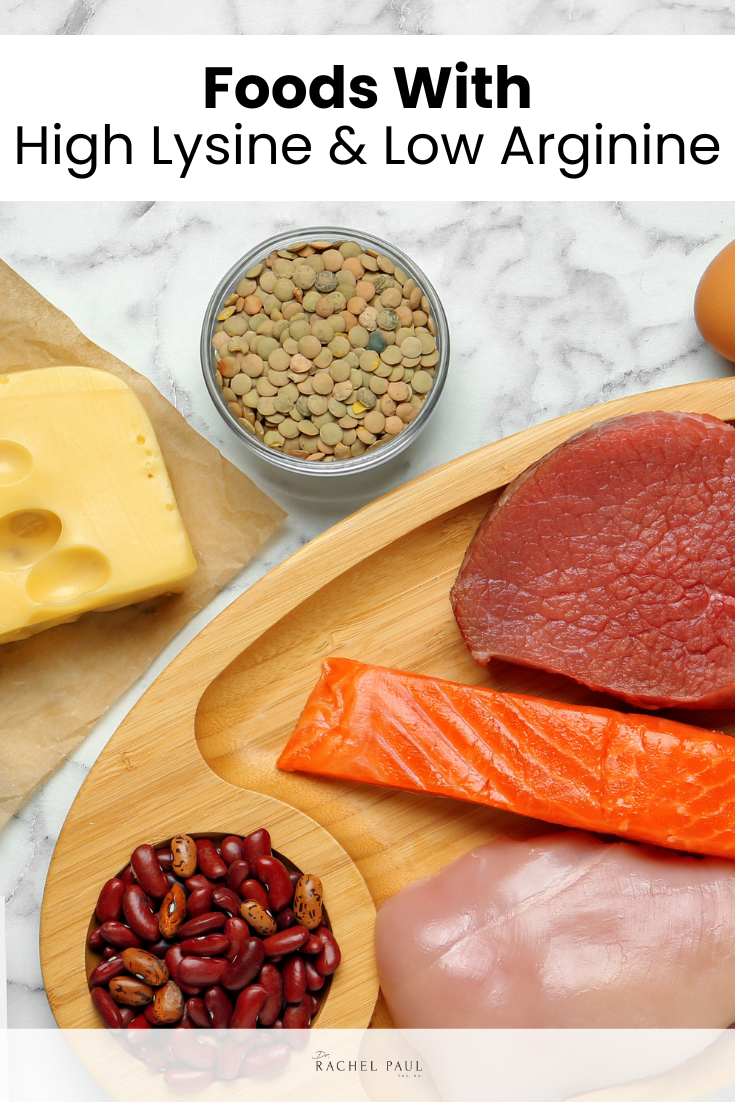With all the different diets out there, especially in the United States with the keto diets to low carb diet and even the caveman diet and intermittent fasting, chances are you probably haven’t heard about the new high lysine low arginine diet? The high lysine low arginine diet is actually more so a dietary approach that focuses on increasing the consumption of foods rich in the amino acids lysine while restricting the consumption of foods containing arginine.
Traditionally, people opt for this diet when desiring to promote muscle recovery, boost immune function, and manage viral infections to name a few. Switching to a high lysine low arginine diet can be useful for people who experience certain diseases like herpes simplex virus (hsv), since that’s one type of viral infection.
So, today I’m sharing a round up of foods that have high lysine but are low in arginine.
Foods With High Lysine And Low Arginine
Before we jump into foods with high lysine and low arginine, let’s first spend some time making sure you understand what lysine and arginine are all about so you can understand why eating certain foods with amino acids including lysine and arginine can be beneficial.
What Are Lysine and Arginine
To begin, let’s break down what exactly lysine and arginine are. So, lysine and arginine are both amino fatty acids, which are building blocks of protein. Lysine is an essential amino acid, which means it’s something that must be obtained through the diet, since our bodies do not produce it. It’s good for viral control and inhibiting viral protein synthesis.
Arginine on the other hand is semi-essential, meaning our bodies can produce some but may also need assistance from the diet during times of illness or stress. It’s good for wound healing and blood circulation.
What Are The Benefits Of Lysine
There are many benefits of lysine, and several reasons why someone might want to increase the amounts of lysine in their diet. Some of the benefits of lysine include:
Muscle growth and repair
Lysine is crucial for muscle protein synthesis, which is necessary for muscle recovery post workouts and muscle growth. It’s best to consult with your doctor before starting any lysine supplements.
Supports the immune system
Lysine produces antibodies which are great for the immune system and as its essential for fighting infections.
Supports viral control
Helps to prevent and reduce the severity and duration of cold sore outbreaks and genital herpes outbreaks caused from the herpes simplex virus (hsv) by inhibiting the virus’s ability to replicate.
Enhances calcium absorption
Lysine can help enhance calcium absorption and retention, which is great for bone health.
Collagen production
Did you know? Lysine helps in collagen cross-linking by enhancing its structural integrity and ability to repair tissues. This makes lysine crucial for collagen production, which plays a vital role in skin elasticity, bone health, and also wound healing.
Reduce stress and anxiety
Although more research is needed, a study showed that lysine has been shown to block receptors involved in stress response and helped reduce cortisol levels, indicating that it could play a role in reducing anxiety.
What Is Arginine For
There are also many benefits of arginine including:
Cardiovascular health
One of the most important functions of arginine is its role in producing nitric oxide, a molecule that helps improve blood flow. This contributes to arginine’s ability to help manage conditions like high blood pressure, erectile dysfunction, angina, and also atherosclerosis.
Muscle growth and repair
Arginine is a semi-essential amino acid. Arginine are building blocks, protein used in the body including for collagen synthesis and tissue repair, making it important for wound healing, muscle growth and repair.
Energy Metabolism
Arginine is involved in synthesizing creatine, a molecule crucial for energy metabolism in muscle cells. A study showed that L-arginine supplements may improve athletic performance, both aerobic and anaerobic, especially when taken before activity.
Supports the immune system
Arginine has been shown to promote the production of white blood cells, supporting immune system health and facilitate white blood cell activity.
Removing waste from the body
Arginine plays a role in the urea cycle, helping the kidneys remove waste from the body.
Lysine Arginine Interaction
Lysine and arginine are amino acids that can interact in various biological systems and can take place at various points including in the protein structure or viral interactions to name a few.
- Metabolic and absorption interactions can cause high levels of lysine to reduce arginine utilization.
- They can interact with aromatic amino acids interactions through cation-π interactions, which is important for protein structure, stability, and function.
- Lysine can also compete with arginine when forming viral capsid proteins and DNA. This can affect a virus’s ability to replicate and can also promote the breakdown of arginine.
- Interactions with lipid membranes impact their function with membrane proteins.
With that being said, there are certain groups of people who should take precaution and may have to avoid increasing their lysine intake. Those groups of people include those pregnant or breastfeeding, people with kidney disease or liver disease, those with a history of gallstones, and also those with those with hyperlysinemia or hyperlysinuria to name a few.
Always consult with your healthcare provider before starting on a new diet to ensure you’re making choices that will be in the best interest of your health and doesn’t conflict with any preexisting medical conditions if you have any.
Foods With High Lysine And Low Arginine
Lysine rich foods offer many benefits as you can see. So if you’re looking for foods rich in lysine and low in arginine, here are the names of some so you can get started on your high lysine and low arginine diet below.
Quinoa
- One cup of cooked quinoa contains 442 milligrams of lysine
- There is 1.09 grams per 100 grams of uncooked quinoa
Chicken
- 4 oz of boneless, skinless chicken breast contains approximately 2,440 mg of lysine
- A 100g serving of cooked chicken breast contains approximately 1.7g of arginine
Egg
- A large egg contains approximately 418 milligrams of lysine
- A large egg contains approximately 0.42 grams of arginine
Lentil
- 1700 mg of lysine per 100g of lentil
- A half cup of cooked lentils contains approximately 1.8 grams of arginine
Dairy product (Milk)
- 16oz of milk contains approximately 1382mg of lysine
- 470mg (0.47 grams) of arginine
Beef
- A 3oz serving of beef can contain over 1,700 milligrams of lysine
- A pound of cooked beef contains approximately 4.131 grams of arginine
Pork
- A 4 oz serving of pork tenderloin contains 2,170 milligrams of lysine
- A cooked pork loin, for example, contains around 14 grams of arginine per rib
Pumpkin squash
- 1 ounce of pumpkin and squash seeds contains 394mg of lysine
- Pumpkin seeds and squash seeds \containing about 5.4g of arginine per 100g
Tuna
- A 4oz serving of cooked tuna contains approximately 2,700 mg of lysine
- A can of tuna provides approximately 2.4 grams of arginine
Yogurt
- one cup of plain, low-fat yogurt contains approximately 1,150 milligrams of lysine
- A 100g serving of low-fat yogurt contains approximately 0.2g of arginine
Avocado
- A 5 oz avocado contains approximately 193 milligrams of lysine
- A 100-gram serving of avocado contains approximately 0.2 grams of arginine
King crab
- Per 100 grams of King crab: it contains 1684mg of lysine
- 1 Cooked Alaskan King Crab leg (or 134g) contains approximately 2.265 grams of arginine
Low Fat Ricotta Cheese
- a 100g serving of part-skim ricotta cheese contains about 1.3g of lysine
- A 0.5 cup (124.0 g) serving of part-skim ricotta cheese contains 0.792 grams of arginine
Navy beans
- A 100g serving of cooked navy beans contains approximately 0.52mg of lysine
- A 1-cup serving of cooked navy beans contains approximately 0.4g of arginine
Parmesan cheese
- a 100g serving of parmesan cheese contains around 3300mg of lysine
- A 1-ounce (28.35 gram) serving of parmesan cheese contains approximately 0.373 grams of arginine
Tofu
- a 4 oz (113-gram) serving of tofu provides approximately 1.2 grams of lysine
- a 100-gram serving of tofu has approximately 3.19 grams of arginine
Soy milk
- A single cup of soy milk contains roughly 658 mg of lysine
- A 1-cup serving of unsweetened soy milk contains approximately 0.826 grams of arginine
As you can see, there is a variety of animal and plant based sources of lysine you can find. When you’re desiring high amounts of lysine intake, use this list as your guide for knowing which food sources you should start adding to your weekly grocery list.
If you’re looking for some inspiration for high protein low calorie meal prep, check out this comprehensive list that has everything you need to prepare high protein breakfasts, lunch, dinner, and snacks!
Follow me on Instagram!


